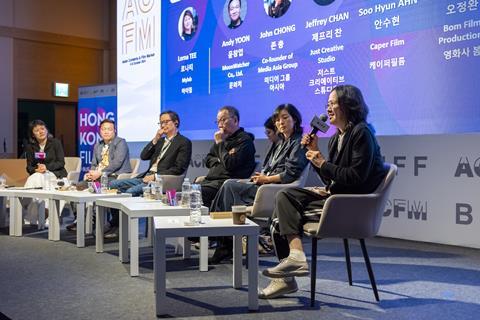
Two panels focused on Hong Kong’s growing role in international co-productions, with an emphasis on the Asian Content & Film market.
Hong Kong Film Development Council (FDC), Hong Kong Cultural and Creative Industries Development Agency (CCIDAHK), and the supporting organisation Hong Kong Trade Development Council (HKTDC) organized the sessions at the Asian Film Market in Busan, showcasing both co-production opportunities and funding schemes
The first panel, “Opportunities in HK-Asia Co-productions,” featured six veteran producers sharing their experiences. They discussed the evolving landscape of international co-productions, noting how the relationship between Hong Kong and China has shifted. China has become the second leading market in the world and quite self-sufficient on feeding its own public, forcing Hong Kong producers to look beyond China to engage a broader, more diverse Asian audience.
“We were told, Hong Kong was too small to have its own audience to support production. So I think the last two decades have given Hong Kong filmmakers the luxury of not looking at other territories, because we had enough demand and enough resources.” confirmed Jeffrey Chan, Executive Vice President of Bona Film Group, now CEO of Just Creative Studio. Throughout his solid career he has executive-produced and produced close to 100 Chinese-language films, such as Infernal Affairs.

Korean producer Oh Jung Wan from Bom Film Production, known for her work with Kim Jee-won and the Three, Monsters co-production, echoed similar sentiments. “I worked in the renaissance of the Korean film, so I didn’t have to stress so much for funds. Now, we need to focus on storytelling to succeed.” CEO of Caper Films, Ahn Soo-hyun, who produced the Korean hit The Thieves (2012) and the Alienoid saga, added that films aimed at global markets from the outset tend to fail, whereas those focused on local audiences, like Train to Busan, have succeeded.
All panellists, moderated by Lorna Tee from mylab, agreed that a shared co-production system would lead to more profitable collaborations. John Chong from Media Asia Group, who has had an astonishing success with the Chinese-Hongkonese co-production A guilty conscience, emphasized the need for training young producers in international contracts, censorship, and banking systems. These thorny aspects consume a significant amount of energy when it comes to co-productions. He suggested national mentorship programs to ease this process.
Andy Yoon, CEO of MoonWatcher from Korea, looks at the European Union as a starting point to see where ideas and creativity can flow into a more dynamic and structured system.
Building on the idea of Europe, Lorna Tee notes that while Asia does not have the same political base, this would not stop content and ideas from traveling. And again “We should adopt a broader perspective because India is also a huge market.”

What the panellists shared, resonated in the case studies brought by Chun Chen On from October Pictures Limited, one of the speakers of the second panel, “Hong Kong Co-production Funding and Local Insights”. With his enormous experience with international projects, co-production in Hong Kong no longer seems like a hurdle to overcome. Analysing Michael Bay’s Transformers 4: Age of extinction, rather than Paramount and Dreamworks’ more recent Ghost in the shell, Chun showed the various landscape of Hong Kong and the practical advantages. Being in a bilingual country with economic stability, anti-corruption laws, well trained talents, and professional and high-speed internet coverage anywhere, Hong Kong confirms itself as a key destination for high budget film production.

One the other hand, Cindy Chan from CCIDAHK, discussed the ongoing Hong Kong-Europe-Asian Film Collaboration Funding Scheme, designed to attract top talent and international productions to Hong Kong.
The first-phase winners have been announced: All The Things We Have Done Wrong That Led Us To This, directed by Daishi Matsunaga and produced by Stanley Kwan, and 38.83, by Cheuk Wan Chi and Shunsuke Koga, each granted $1.1 million.
The second phase is currently accepting submissions, with the application period closing on November 22, 2024. Six additional projects will be selected and announced in 2025. Chan was very open and positive that, by learning from the Scheme One, there will be a following and better improved Scheme Two.






















